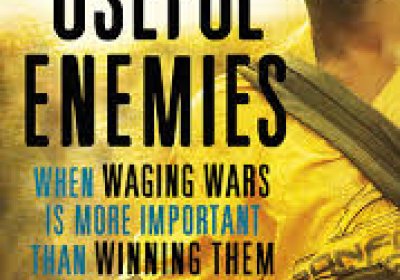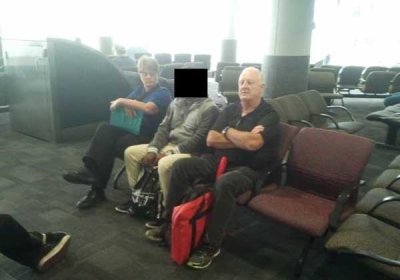The Mekong River is the mother of all south-east Asian rivers, providing life-sustaining resources to millions of people. Now, the future of the Mekong, its people and wildlife are in jeopardy.
The government of Laos plans to build the hydroelectric Don Sahong Dam — the second dam proposed for construction on the Lower Mekong mainstream — on the main pathway in the Mekong that allows for year round fish migration.
1040
Venezuela rejects new US sanctions
The Venezuelan government rejected aggressive new US-imposed sanctions on February 3, TeleSUR English said that day, insisting the measures flout international law.
Venezuela's foreign ministry said in a statement: “The people of Venezuela ratifies its independence and sovereignty. We do not recognise … interference of any kind by foreign powers.”
It accused the US of “violating the principles of national sovereignty, equal rights and non-interference in the internal affairs inherent in international law”.
Useful Enemies: When Waging Wars Is More Important Than Winning Them
By David Keen
Yale University Press, 2012.
Governments in the US, Britain and Australia seem intent on waging war in faraway lands, supposedly to bring freedom and democracy to foreign peoples and to deliver us from the chaos of terrorism.
David Keen's useful Enemies, however, shows the folly of the policies being pursued. Far from bringing peace, it turns out throwing arms, bombs and money against opponents who refuse to neatly line up as targets is more likely to fuel the conflict.
The Refugee Action Coalition released this statement on February 5.
***
Fifteen Iranian asylum seekers are on their 19th day of hunger strike in Darwin’s Wickham Point detention centre.
Meanwhile, Martin, who has been on hunger strike since November last year, is very weak and close to death.
Martin and the 15 are part of a group of about 35 Iranian asylum seekers who are being held indefinitely in detention. The government is unable to remove them to Iran because the Iranian government refuses to accept forced removals from Australia.
Clivosaurus: The Politics Of Clive Palmer
Guy Rundle
Quarterly Essay
November 2014
Black Inc., $19.99
Elected in 2013 by the curious, the disaffected and the dark arts of preference deals, billionaire Queensland coal baron Clive Palmer and his Senate threesome, were, at first, writes Guy Rundle in Clivosaurus, ignored or played for laughs by the establishment media.
Three passengers were removed from a Qantas flight from Melbourne to Darwin on February 2 after refusing to take their seats in protest against the transfer of an asylum seeker on the same flight.
A 25-year-old Tamil man known as Puvaneethan was being transferred from Maribyrnong detention centre in Melbourne to Darwin. He was distressed about being separated from his family in Melbourne.
Disunited Kingdom: How Westminster Won a Referendum But Lost Scotland
By Iain MacWhirter
Cargo Publishing, 2014,
174 pages
The independence referendum on September 18 last year has been hailed by many as the most important event in the recent Scottish history.
The result was far closer than any supporter of independence would have dared predict even a few months before the vote. About 1.6 million voters (45%) refused to be swayed by a sustained fear campaign by the British state and its allies ― voting “Yes” to Scottish independence.
If you reading this after Tuesday, there's a chance we could have a new Overlord.
Liberals spooked by polls so bad that an electoral coalition between Islamic State and Ebola — or hell, even the Labor Party — could probably win the next federal election, are holding a leadership spill that could dump Tony Abbott as prime minister less than half way through his first term.
Leading trade unionists, Irish republican party Sinn Fein and a range of other left voices have backed a call for a new anti-austerity force in Irish politics capable of winning government.
In the wake of SYRIZA’s historic win in the Greek elections on January 25, Sinn Fein national chairperson, Declan Kearney, called for formal discussions to begin on building an Irish left coalition to cohere an anti-austerity government in the South.
On January 30 a meeting of the New South Wales Education Action Network (EAN) was convened at the University of Technology, Sydney. The EAN is a cross campus collective of university students committed to fighting fee deregulation and for free education. It is open to all student activists.
Dunking her biscuit into the cup now covered in a suitable amount of filth, she thinks about the time she went driving up a mountain range in Cape York. “What a beautiful area — shame about the people.” Fully aware she’s been accused of intellectual snobbery on more than one occasion, she lulled herself into a meditative state, knowing she would have to turn on the charm once more. “I say vagina and cunt twenty times a day and they still accuse me of it,” she said out loud this time.
The boats that “just kept coming and coming” under Labor have been “all but stopped”, Prime Minister Tony Abbott declared to the Press Club in his widely described as “crash-and-burn” address on February 2.
“The Abbott government has stopped the boats — and only this government will keep them stopped.”
- Page 1
- Next page









